Things have come a long way since my wife and I used to go on backpacking trips with whatever we could
carry on our backs: tent, sleeping bags, cook gear, food, clothes, lanterns and small items. In those days
of your we never even thought about having a small camper, much less a big fifth-wheel. When we did eventually
get our first camper
(see here) we jumped directly into a fifth-wheel, mostly due to the
fact that it was
an impulse buy! Only later did we consider the fact that there are many other types of rigs to choose from.
Of course we wouldn't trade our fifth-wheel and dualie for anything now, but a website on RVs wouldn't be
complete with talking about all the other types of rigs out there, ranging all the way
from small popup campers the big Class A motorhomes.
Let's start out by giving some useful definitions of the different types of rigs to choose from.
- Popup - basically a fold-up tent mounted on a trailer chasis and towed behind a car or truck
using a standard trailer hitch (either bumper or frame mounted).
- Travel trailer - also towed, but uses a goose neck ball hitch mounted in the truck bed.
- Fifth-wheel - similar to a travel trailer, but uses a truck bed hitch system like that found on a big semi.
- Class C - camper mounted within a truck bed.
- Class B - essentially a van customized for camping.
- Class A - motorhome, basically a customized unit mounted on a bus frame.
- Toy hauler - a travel trailer, fifth-wheel or Class A with a rear section designed to carry a vehicle or
specialized equipment.
- Park model - a mobile home or other type of unit intended for renting at campgrounds.
- Other - this includes converted buses, van conversions, or other customized units.
Popups
|
Popups are historically the oldest type of camper. I remember seeing them back in the '60s and they weren't a
new idea even then. Originally not much more than foldup tents mounted on a chassis, they have evolved into pretty
nice systems with an eating area, sleeping area, fridge, and so on. Some even offer hard roofs, heaters, TV and
even rooftop A/C units.
Popups are great for folks that like the camping life but don't want to spend a lot of money on extra
conveniences. While better than sleeping on the ground in a tent, popups tend to be more attractive to
those on the younger side.
Popups can be surprisingly roomy, especially if they have extensions on either end.
Advantages
- Popups let you get that "commune with nature" feeling more than the larger units. You can more easily
hear the birds and crickets, smell the campfire, feel the breezes, and hear the raindrops on the roof.
- Popups let you easily squeeze into places that might otherwise get hard to get into with large rigs.
Examples include lake or river shorelines, the feet of mountains, roadside pull-overs and so on.
- Usually cheaper that the other alternatives. Simple to operate. Makes a good first camper.
- Relatively lightweight. Can be easily towed with most normal sized cars and trucks.
- Good for dry camping (aka boondocking), especially when no hookups are available.
- Many campgrounds, especially those at National Parks, were designed and built for smaller rigs. As such,
they cannot easily accomodate larger rigs.
- Popups are easy to store and maintain.
Disadvantages
- Limited room; cramped quarters.
- Can take a lot of time to set up and break down. This can be especially annoying if you have
limited time, like a weekend trip.
- Subject to swaying while on the highway, especially when the big rigs blow by. Look into installing
sway bars.
- Popup parts are more subject to breaking than with most other types of rig, especially if subjected
to frequent use. Breaking a pole or lifter can easily ruin your trip.
- Not much room for storage, especially tall items while driving.
- May not have inside electric outlets. May have to use propane lanterns.
- Probably no cooking appliences. Need to use portable stove, coolers, etc.
- Probably no bath facilities.
- Probably no TV, but do you really need one?.
Warning: you might not want to go overboard and spend a lot of money on a popup, especially if it's
your first camper. The problem is that you might just well get addicted to RV-type camping and decide to
upgrade to something like a travel trailer, fifth-wheel or Class C. Spending too much on the popup may
make it difficult to get a lot of your money back when you decide to sell it. Maybe consider a used one -
and pay cash!
| |
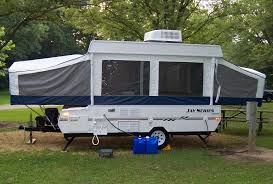
| |
[click to enlarge]
|
|
Travel trailers
|
Travel trailers represent a major step up from the popup camper.
It is probably the type you most commonly see on the roads. The unit hooks onto a regular
bumper hitch or frame-mounted ball hitch. They have been around for years and years so their construction
technology is probably a bit better than even the newer fifth-wheels.
Travel trailers represent a good compromise between popups and fifth-wheels. Like fifth-wheels they have
hard bodies and some even have one or more slideouts. They are also priced significantly cheaper than
fifth-wheels and motorhomes.
Advantages
- Cheaper than a fifth-wheel.
- Easier and quicker to attach and detach than a fifth-wheel.
- More economical to pull than a fifth-wheel.
- Less maintenance requireed than larger rigs.
Disadvantages
- Unlike motorhomes, you will have to pull over when you need a bathroom break or to get a bit to eat.
- Can get hot and stuffy in heavy sun while being towed.
- As with popups, swaying can also be a problem with travel trailers. Look into sway bars.
| |
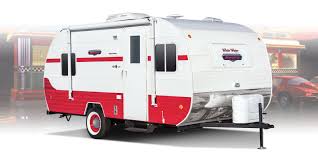
| |
[click to enlarge]
|
|
Fifth-wheels
|
Often referred to as "fifths" or "fivers", and sometimes written as 5th-wheels,
fifth-wheels are the largest category (size-wise) of towed campers. Depending on the size and weight of the rig,
fifth-wheel owners pull their rigs with trucks ranging from single axle trucks to dual axle heavies ("dualies").
The term "fifth-wheel" derives from the type of hitch used. If you've ever looked closely at the hitches
used on the big semi rigs, it's pretty much the same thing. The hitch plate is mounted in the truck body,
normally directly over the rear axle to best distribute the weight. The trailer has a curved arm that
fits over the truck's tailgate and slips into the hitch plate via the arm's "king pin".
Fifth-wheels range in size from somewhere around 20' up to 40' in length. The longer the trailer, the more amenities
it can hold. Our 37-footer has a stove and oven, microwave, medium-size fridge, sink, pantry, center island, fold out couch,
two recliner chairs,
dining area, electronic fireplace, shower, sink, toilet, large bed and dresser, large closet, three TVs and three
slideouts. The big 40-footers can have even more, like a full-size fridge and/or bathtub.
One big advantage of a fifth-wheel is that you can use the truck when not towing the trailer. So you
simply unhook the trailer and drive the truck around to see the sights. Moreover, I can't tell you how
many times I've used my dualie around town hauling dirt, sod, building supplies, furniture and so on.
Something you should be aware of is that the articulated nature of the fifth-wheel / truck combination
can make turning somewhat problematic, especially in tight areas. I have
Advantages
Disadvantages
-- articulated nature
| |
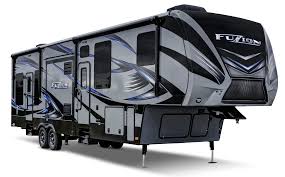
| |
[click to enlarge]
|
|
Class C
|
This is basically a drivable camper that looks like a typical delivery truck with an overhead unit,
mounted on a fairly large truck frame.
Class C's usually have a door between the cab and the camper area, which contains the kitchen, sleeping and
living areas. Appliances include a small fridge, stovetop and maybe a microwave.
Current technology allows Class C units to reach lengths of over 40' in length.
| |
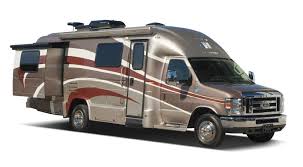
| |
[click to enlarge]
|
|
Class B
|
Class B's neatly fit in between the truck bed mounted Class C and the big Class A motorhome. They are
essentially customized vans built to include camping and sleeping facilities like appliances, raised
roofs, A/C, and so on.
Like Class A's, Class B's have the advantage that they are drivable. Unlike Class A's, they are cheaper
to drive. If you like the convenience of not having to tow and don't plan to do extended camping stays,
a Class B might be just the thing for you.
| |
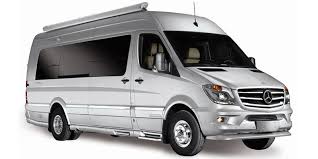
| |
[click to enlarge]
|
|
Class A
|
Now for the big boys. For those who can afford one, the bus-chassis-based type of RV motorhome
(also called a coach, bus, pusher or big rig) may be worth looking into. Although expensive,
Class A's have the distinct advantage that they are solidly built on top of a well-established,
time-proven bus-like chassis system.
It is interesting to note that the original motorhomes were actually built on modified Greyhound-type bus franes.
Another advantage is that the driver and passenger can operate the vehicle in comfortable chairs, and even
enjoy the inside amenities while driving.
By the way, the affectionate term "pusher" derives from the fact that, unlike standard cars
and trucks, the motor is in the rear of the vehicle. Another term you will find associated with pushers is "toad",
referring to a towed-behind vehicle, usually a small car or Jeep.
Pushers generally come with many appointments you likely won't find on most fifth-wheels.
Examples include tile floors, full-size fridges, washer/dryers, bigger baths, desks,
larger kitchens, lots more storage, bigger tires, self-leveling systems, a generator
and so on. Simply put, you can put a lot more stuff in and on a 40,000 lb rig than
you can in a 14,000 fifth-wheel. And, of course, big pushers also come with a much
fatter price tag.
Pushers have several advantages over fifth-wheels, such as more
indoor room and storage areas, as well as a few disadvantages. Here I've listed a few
of each.
Advantages
- Motorhomes generally have most of the conveniences of home that you won't find in the
other camper types, except possibly the more expensive and long fifth-wheels.
- Generally more room inside, in foot-for-foot comparison with fifth-wheels.
- Easier and quicker to arrive and depart; simply pull in and hook up.
- Self-leveling jacks.
- Easier to turn or, back up - but you have to unhook the toad first.
- More storage room underneath.
- Usually more awnings and/or slideouts.
- Some come with outside fridge, tv, etc.
Disadvantages
- Usually need to pull another vehicle, the "toad".
- Usually a lot more expensive per square foot.
- Insurance, maintenance and tires are much more expensive.
- Two motors (bus and toad) with attendant maintenance and repair considerations.
| |
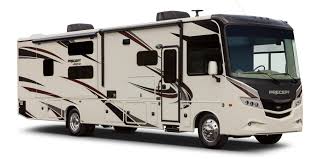
| |
[click to enlarge]
|
|
Toy haulers
|
Toy haulers are relatively recent additions to the RV community. Most I have seen have been modified
fifth-wheels but there are certainly those in the travel trailer and Class A or C classes. They are
distinguished by a dedicated rear compartment with either dual swinging doors or a fold-down ramp
for offloading vehicles or equipment.
Toy haulers are typically used to carry racing cars, motorcycles, water craft, ATVs,
hot air balloons, show equipment, music gear, large equipment, tools and the like.
I have seen RV-ers that use the rear area as an additional living area. This can be especially
attractive if you travel with those who cannot conveniently share the bedroom or fold-out couches.
In other words, it would make a great in-law area.
| |
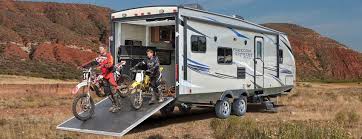
| |
[click to enlarge]
|
|
Park models
|
Many (if not most) of the RV campgrounds you will go to in the U.S. will have some park models
available. These are either mobile homes or permanently set large campers like fifth-wheels.
Park models are intended for long stays, and can either be long term leased, or bought outright.
Many park models are designed to look like homes. They offer electric, water and (usually) sewer hookups.
Most park models are owned, and are usually located not far from the owner's home. Many park model owners
rent out their units like condos, although some use them themselves all season long for weekend camping
trips with the family.
Some park models are established by the campground itself, and either rented or leased to others. Some
folks buy a unit from a manufacturer and simply rent or lease the space to put it on.
| |
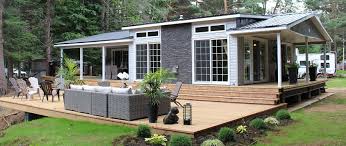
| |
[click to enlarge]
|
|
Things to consider when buying a rig
Most of the comments discussed here apply to fifth-wheels or larger. For example, you are not likely to
find slideouts or fireplaces on a popup.
- The tires that come with a fifth-wheel (or most any other type short of a bus)
will probably be "dealer grade", which is another
way of saying that they're crap. They'll probably get you home if you don't have a long way to go,
but before you load up and take any trips make sure you get
some tires that aren't going to blow out on you as soon as you get an inconvenient distance
away from home. Either negotiate with the dealer to have good quality tires put on, or replace them
as soon as you get home. If you're not already familiar with the pros and cons of trailer tires
and can abide a recommendation, our
Goodyear Endurance tires took us through the worse that the
roads of the Canadian Maritimes had to offer over 15,000 miles and are still going strong!
- Get as many slideouts as you can. They will make life much more enjoyable. I recommend
at least 3 for a good-sized trailer. Four would be all the better. If you plan to do what's
called "dry camping" you will need to make sure that your slideouts have strong enough motors
to operate on 12 volts. If not, you will probably have to get a generator or a 12-to-100 volt
inverter.
- And speaking of slideouts, try to get awnings on as many slideouts as possible.
They are invaluable on hot, sunny days as well as rainy days.
- If you have two a/c units you will probably already be configured for 50 amp. Two a/c-s
will not work with 30 amp.
- An exterior 110 volt receptacle is very convenient. Having one on each side is doubly so.
-
- You will find that you never have enough storage. Lots of space in the basement will
have a big payoff. Same with cabinet space. There are other tricks, such as space under
the bed, and even pockets on the undersides of chairs.
- Pay attention to the window treatments. Most trailers come with pretty crappy blinds
or shades. The accordion shades might work well at first, but they tend to buckle up and
stick after use. This is especially so if you have dogs that like to look out the windows
and paw on the shades. Double blinds are attractive and work well, and some come with sun
shades. But don't get too heavy as the weight does tend to add up.
- Make sure the roof is solid construction. Avoid seams if at all possible, as they tend
to leak over time. Also make sure the roof accoutrements such as a/c units, sunlights, vents,
etc have been caulked well.
- One of God's little blessings is self-leveling jacks, also called stabilizers. There will
be jacks on the front and rear of the unit, although you will likely have a hard time finding
self-leveling stabilizers on the rear.
- Having as many propane tanks as possible is good. I have 4 on my 37-footer, and it's nice
to be able to disconnect one to use with my gas grill.
- Interior construction should have plywood behind the vinyl. Not only does this make for
a sturdier frame, it also allows you to screw things into the walls -- but be careful you don't
hit any electric wires!
- If you can get at least some 100 v. interior lighting, so much the better. 12 volts just
don't put out that much light!
- Some models have a built-in tv in the living room. This is very nice. Ours has a long
wooden tray on the top of the set which is very handy for storing small, frequently needed
items such as remotes, pens, etc.
- A built-in fake "fireplace" might be pretty at first, but you will likely tire of it
after a while. A model with a functional desk or something else might be more practical.
Some such fireplaces come with a small heater, but it is usually quite inefficient. You
would probably be better off with space heaters if you are considering going to cool or
cold places.
- Speaking of heaters, depending on where you travel to a good central heater would be
a good investment.
Things to look for:
- Strong slide-out motors
- Strong jacks and stabelizers
- Self-leveling jacks
- Good a/c, heater
- Good off-air tv antenna
- Dual-mode fridge
- Sealed roof, no seams
- Strong brakes, axles
- High-rated tires, if possible
Extras to consider
- If you will be pulling a heavy rig, like a fifth-wheel, you'll want to get an in-cab brake control
system. These units automatically activate the trailer brakes when you put the brakes on your tow vehicle.
This keeps the trailer from pushing your tow vehicle while you're trying to slow down or stop.
Take it from me, if you pull a heavy rig without one you're just asking for an accident.
- A compressor is one of the more useful big ticket items. If you happen
to have a flat tire out in the boonies, you'll thank God you have a compressor. Also don't forget the air
hose as well as tools, like an impact wrench and sockets to fit your lug nuts. You'll also want
to have a pneumatic jack to raise your rig if it's too heavy to manually jack up.
- Most generators run on electricity, so unless you're fortunate enough to have a flat close to a 110v power
source, like a campground hookup, you'll need a generator. If you have a Class A you probably already
have a built-in unit. Otherwise you'll have to get your own. The kind we have runs on either gas or
propane, which is very convenient when dry camping. It also fits into our truck bed box. Not only is a
generator useful for powering a compressor, it will be almost a necessity if you plan to do a lot of
boondocking.
- If you don't have equipment to change your own tires, do consider purchasing a
service like Good Sam Roadside Assistance or AAA. We used our Good Sam membership several times before we got
our compressor and generator. They were always reasonably quick (avg about an hour) and were very helpful
and courteous. Be aware that these services probably won't be available in Canada or Mexico. I don't know
about Alaska.
- Speaking of truck bed toolboxes, I made sure that ours was big enough to hold my compressor,
generator,hose, tools, fluids, long extension cord and some other stuff as well. If you have a fifth-wheel,
one thing to be aware of is the clearance between the top of the toolbox and the fifth-wheel arm. Tight
turns could cause them to make contact and do damage to the box.
- I've been threatening for some time to get an air horn for my dualie. More than once have I been caught in
a situation where I couldn't stop in time for a red light, and tapping on a very loud air horn would alert
folks that we were coming through. Luckily there haven't been any real dangers (yet) but I believe in
being prepared.
- Speaking of being prepared, if you're going to be taking long trips to remote areas, you might want to
consider a second fuel tank for your truck. We have a friend who has one who swears by it. No more having
to pull off to fill up when you tank gets down to 1/2 or 1/4 full. I guess it just depends on how much you
value insurance policies.
- Lots of big rig owners have rear camera systems. These are especially valuable if (a) you don't have a
partner that is good at helping you back up, or (b) you are squeamish about doing so. Now that rear cameras
are almost ubiquitous in passenger cars, using one with an RV should be second nature.
- In the same vein, a tire pressure monitor is also a good insurance policy to have. Tire problems occur when
pressure falls below the manufacturer's recommendations, especially at high speeds or in hot weather. If you
get one, make sure it has a loud audible alarm.
- Dualie trucks can be outfitted with chips that can increase your fuel mileage, power or both. They are
expensive but if you do a lot of travelling - either pulling a rig or not - you may find it worthwhile.
If you're thinking about getting one, be sure to do the math to see how many miles you would have to travel
to make up for the cost. And unless you're particularly handy automotive-wise you'll probably need to have
a qualified technician install it. There is lots of info on the 'net about truck chips so do the Google.
- I haven't researched air cushions for fifth-wheels but I plan to in the not-too-distant future. At this
point I'm not sure it's worth it (they are expensive) so we'll probably continue to live with the bumps.
- If you are planning to stay somewhere for awhile, a outside screened room is both nice
and practical. Not only is it great for keeping away bugs, it also provides a nice
entertainment and relaxation area. Better to be outside than inside, right? But if you
are likely to be pulling up stakes and leaving every two or three days, a screened room
can be more of a hassle than an advantage.
- Chairs and tables are almost a necessity -- lounge chars, concert chairs or whatever,
and fold-up tables. But don't be tempted to get the heavy ones you might find at places
like Camping World. They add too much weight for long trips, especially if you don't have
great tires. Check out Amazon.
- It is not uncommon to find campgrounds that only offer 30 amp service. If you have a
50 amp unit, pick up a 50-to-30 amp conversion plug. It is usually a couple feet long with
a 30 amp male plug on one end and a 50 amp female receptacle on the other. I believe there
may be other types, but I haven't researched it. They can usually be found at any RV outfit.
- If you plan to do any computer work in your rig, get a wi-fi detector to plug into a
USB port. Depending on your computer, you may have to install some software to use it.
Be aware that wi-fi reception can be pretty spotty at many campgrounds, Your reception may
depend on time of day and how many people are using it. I have see campgrounds where
reception may be good or non-existent depending on which particular site you're parked in!
- By the way, I don't have personal experience with so-called wi-fi "extenders," so I
cannot make any recommendations. If anyone does, please tell us all about it on the
blog pages.
- Take tools. Don't even think about it. We have a tool chest in our front storage area
with things such as pliers, screwdrivers, wrenches, hammers, vice grips, adjustable wrenches,
allen wrenches, etc. And an assortment of screws wouldn't hurt either. I also carry a drill,
battery and charger - I can't even tell you how many times that has come in handy!
- An extra sewer hose extension would be nice. We have actually parked at a place where
we had to use the sewer connection in the neighboring site. Also make sure your water hose
is pretty long for the same reason. Ditto for your cable wire.
- Think about portable outside lighting. You will be spending a lot of time outside,
grilling, chatting or whatever. By the way, we have a basement tv so we can watch the
shows while we're outside - damned if we're gonna miss The Voice just because we're eating!
- If we're going to be away for a long time, or staying in one place for awhile, we take
along a cooler that serves as an extra fridge. Our Coleman can run on either 12 v or 110.
We put it in the back seat and run it off the cigarette lighter while we're travelling, and
then put it under the trailer and connect it to 100 while were stopped. We also have a
portable freezer made by Della. It doesn't weigh a lot and is handy for stocking up on
frozen stuff, especially if you are a long way from a store. Unfortunately it only runs on
110 so it cannot be used while travelling long distances, but a friend told me he has one
that works with both 12 v and 110. I'll find out about it and let you know.
- Some campgrounds can experience power surges. A surge protector can be a lifesaver,
especially if you have sensitive electronics like a computer on board.
- In a similar vein, surges in water pressure can also happen. This can be particularly
true in places in Canada like Nova Scotia and Newfoundland.
- Accessories - coolers, space heaters, etc
- National parks pass -- also work for Army Core of Engineers properties, such as
Lake Alatoona in Georgia.
- There are a lot of RV-oriented apps available for your smartphone. We have personally used several of
ours many times, especially when locating stations with diesel or places to eat. Voice activated search
service is great for finding a Home Depot or Walmart.
See here for a good list of apps you could use.
- We swear by Rainex. Get in the habit of using it on your windshield before you travel. It literally
makes rain bead up and roll of while driving.
- If you and your partner don't both have cell phones (?) you might want to get a pair of walkie-talkies.
This makes backing up much easier than having to deal with waving hands or lots of yelling.
- -- extra pins ...
My dream RV
Having camped at around 50 campgrounds and parks and put in around 25,000 miles on our rig,
I've given a bit of thought to what
I would look for if I bought another unit. As a result I've come up with a list of things
that I consider constituting my dream RV. Of course I don't have unlimited funds, so
some items in the following list might have to go if I did get another rig. So the list
defines my dream RV, not necessarily my next RV ☺.
However, see the note at the end of the page for an example rig that might be desireable if money
is not an object.
- high quality A/C and heater
- self-leveling jacks; probably pneumatic?
- home-size fridge
- moveable center island
- plenty of storage
- dual axle, room for big tires
- heavy duty shocks
- DVD/CD player with surround sound
- desk?
- large capacity grey & black tanks
- large water holding tank
- large hot water on-demand tank
- large closet space
- outside 110v receptacles
- good off-air digital antenna
- low bottom step
- 2 b/r slideouts
- deep slideouts
- deep kitchen sink
- 110v ceiling lighting
- good quality blinds
- good window openings
- no seams on roof
- strong slideout motors
- central vac, with outlet in basement
- lights in basement
- awnings on all slideouts
- more slideouts rather than big ones? less strain on motors
- fold-up rear ladder
- heavy duty brakes, shocks
- upgraded tires, G-rated or higher
If you would like to see a rather large list of some goodies you can get for your rig
click here.
While I'm not in the business of recommending RV manufacturers, I ran across this
Youtube video of a tour around a
nice fifth-wheel made by
SpaceCraft Mfg. If price is no object and you're into helping
design your own custom rig, you might want to take a look. They look like they are well built for four-season living
and have most or all of the amenities you could want. Their fifth-wheels go up to a whopping 53' in length!
Also check out Entegra Coach where you can also build and customize your
luxury motorhome.
Consider renting an RV
|
Before laying down serious money for an RV, you might want to think about renting one first. Once you've settled
on an RV type, or maybe even a particular brand, you can allay lots of fears by first renting a rig to verify
your expectations. By doing so you can either comfort yourself that you inded made the right decision, or you
may find out that it's just not for you. It's a lot like renting a house for a few months in a neighborhood before
you buy.
You might also want to rent different RV types: tow trailer, fifth-wheel, Class A, B or C. Towing versus driving
comes with its own advantages and disadvantages, and you would be well served to discover them first hand.
Rig length is also important. While the rig you have your eyes on may be relatively less expensive, you could be
surprised to found that you actually need more space for you and your family. This is especially true if you have
kids and plan to take lots of stuff on your trips.
There are lots of RV rental sites on the web.
Here's one.
I also recommend that you take a serious look at renting if you plan to RV up in Alaska. State roads there are bad
enough, but the trip up can virtually destroy a rig. Think about taking a leisurely trip up on the ferry and then
pick up a rig when you get there. Renting a rig in Alaska won't be cheap, but neither will doing serious repairs
or replacing a rig altogether. If you decide to do it, be sure to reserve early so you won't find yourself stranded
when you get there.
| |
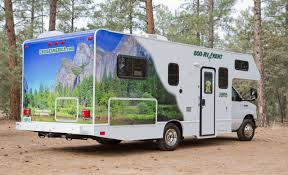
| |
[click to enlarge]
|
|
Some final thoughts
While all the above may sound intriguing, and indeed captivating, be warned - looking at expensive RVs is a little like a realtor showing you the most expensive house
in the neighborhood first. While it may be nice you will probably find all the other houses to be a dissapointment.
So unless you're made of money you may want to put off looking at very pricy rigs until you have decided on a more
practical one.
Many new RV buyers fall prey to a temptation to get the fanciest rig and latest equipment they can find, maybe
fueled by an unconscious desire to impress friends and relatives. If funds are simply not a problem for you then by
all means go ahead. However, if you're like the rest of us you might be better off to temper your
expectations toward more reasonable accommodations, something you and your family will be happy with for a long time.
As a personal example, our 37' fifth-wheel trailer and tow truck together ran to a combined total of around $70K. We bought the
trailer as a showroom demo and the truck was a couple years old with low mileage. We have been pretty happy with the
rig and ecstatic with the truck. Of course there are amenities we could have gotten by spending another $100K but we
would rather spend the money doing extensive travelling.
We sometimes find ourselves saddened by campers in big fancy rigs that simply sit in campgrounds. They wouldn't
think of taking their investment to places like Canada or Alaska where the roads are rough and trailer damage
is almost certain. But we simply don't worry about that; post-trip maintenance of any length more than a few
days almost always includes some repairs in
one way or another but I don't mind. Working on my rig is good therapy as well as valuable experience since I know
I can now address almost any problem that might arise while on the road. Besides, that's where all the good tips, hints
and techniques found in the
How To sections of this site came from ☺.